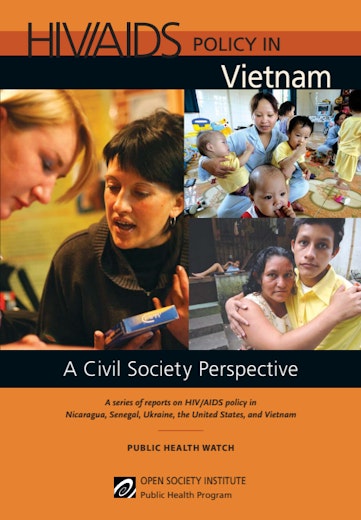HIV/AIDS has spread rapidly in Vietnam since the first case was registered in 1990, and today more than a quarter-million people in the country are living with HIV/AIDS. The national HIV prevalence rate among adults is 0.5 percent, but prevalence rates are significantly higher among high-risk groups, such as injecting drug users (33 to 65 percent) and sex workers (approximately 16 percent). However, the illegal nature of drug use and sex work has complicated efforts to prevent HIV among these high-risk groups. Harm reduction interventions, such as the provision of sterile needles and syringes to drug users and condoms to sex workers, are only now being implemented gradually.
According to the Public Health Watch report HIV/AIDS Policy in Vietnam: A Civil Society Perspective, evidence suggests HIV/AIDS is spreading beyond these high-risk groups through the intimate partners of drug users and clients of sex workers. In 2005, more than 70 percent of new HIV infections occurred through sexual transmission. However, Vietnam’s current response does not effectively address this rapid rise in sexual transmission.
Several factors contribute to this situation, the report finds. There is a lack of trained health care professionals to adequately care for and treat people living with HIV/AIDS. Administrators at the provincial, district, and community levels lack management skills and technical knowledge about policies, and there are insufficient resources to comply with policy directives from the central government. In addition, there has been little coordination of efforts between donors and government. Donors tend to fund specific projects, which often reflect their own priorities, rather than funding overall development objectives.
In order to prevent a nationally generalized HIV/AIDS epidemic, HIV/AIDS Policy in Vietnam identifies two key areas for immediate action: redouble efforts to stop the spread of HIV by implementing proven interventions, and ensure full and meaningful participation of civil society, including people living with HIV/AIDS and marginalized groups, in the national HIV/AIDS response.
